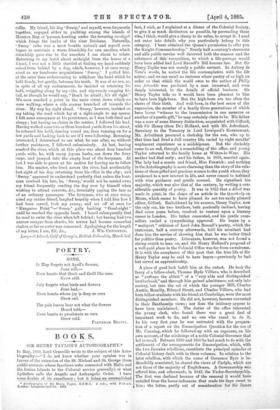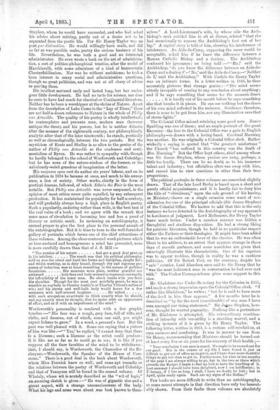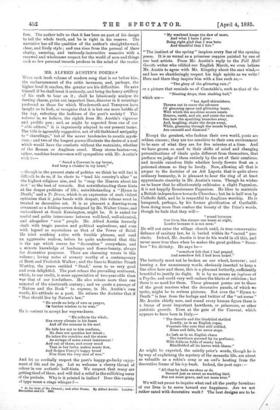BOOKS.
SIR HENRY TAYLOR'S AUTOBIOGRAPHY.*
IN May, 1869, Lord Granville wrote to the subject of this Autobiography :—" I do not know whether your opinion was in favour of the extension of the St. Michael and St. George (from public servants whose functions were connected with Malta and the Ionian Islands to the Colonial service generally), or what Lyttelton calls the Angelic and Archangelic Order. I have some doubts of its expediency ; but it being an accomplished • Autobingrapsy of Sir Hoary Taylor, K.C.M.G. 2 vol.., with Part-alt. London Longnmns and Co. 1885. fact, I wish, as I explained at a dinner of the Colonial Society,. to give it as much distinction as possible, by persuading those who, I think, would give a stamp to its value, to accept it. I need not enter into details why you particularly belong to this category. I have obtained the Queen's permission to offer you the Knight Commandership." Nearly half a century's strenuous and able public service well deserved both the manner and the substance of this' recognition, to which a life-peerage would have been added had Lord Russell's Bill become law. But Sir Henry Taylor was not merely a public servant. In Aubrey de Vere's words, he united the life contemplative with the life active ; and we can recall no instance where poetry of so high an order as that which the world owes to the author of Philip van Artevelde was produced by a man immersed, and even deeply interested, in the details of official business. Sir Henry Taylor tells us it would have been pleasant to him to have been high-born. But the high-born are too often the slaves of their birth. And well-borne in the best sense of the expression, the member of a family three generations of which. have borne "witness to the transmission in one measure or another of a poetic gift," he may certainly claim to be. His father was a man of some literary distinction, acquainted with Gifford, with Sir Henry (then Dr.) Holland, and nith Mr. Arbuthnot, Secretary to the Treasury in Lord Liierpool's Government. Mr. Arbuthnot procured a clerkship for the son; who up to that time had lived a dull country life, varied by eight months' unpleasant experience as a midshipman. But the clerkship came to an end, through a remodelling of the office, and young Taylor returned to the family home at Witton-le.Wear, His mother had died early ; and his father, in 1818, married again. The lady had a cousin and friend, Miss Fenwick; and nothing. in the Autobiography is more charming than the story of the relations of these gifted and gracious women to the youth whom they awakened to a new interest in life, and never ceased to befriend with wise guidance and gentle conned. He signalised his majority, which was also that of the century, by writing a considerable quantity of poetry. It was in 1822 that a debut was made in print, in the shape of an article in the Quarterly on. Moore, which seems to have pleased its not too easily pleased editor, Gifford. Emboldened by his success, Henry Taylor, now the only son, his two brothers, both poetically inclined, having died some years before, resolved to venture. upon a literary career in London. His father consented, and his gentle counsellors smiled a sympathising approval. He began by a " malapert " criticism of Lord John Russell's poetry, which the statesman, half a century afterwards, told; his assailant baddone him the service of showing him that be was better fitted. for polities than poetry. Literature, however, was not found a strong crutch to lean on, and Sir Henry Holland's proposal of a well-paid place in the Colonial Office was far from unwelcome. It is with the acceptance of this post that the true life of Sir Henry Taylor may be said to have begun—previously he had but served an apprenticeship.
A piece of good.luck befell him at .the outset. He took the fancy of a fellow-clerk, Thomas Hyde Villiers, who is described. as "perhaps the ablest" of a "very able and distinguished brotherhood," and through him gained admittance, not only into society, but into the set of which the younger Mill, Charles Austin, Romilly, Edward Strutt, and Charles Villiers, who had been fellow-students with his friend at Cambridge, were the moat distinguished members. He did not, however become converted' to their Benthamite views ; nor does the intimacy appear to have been maintained. The duties of the office interested the young clerk, who. found there was a great deal of important work to do, and no one who cared to do it. In his very first year. he" was entrusted with the preparation of a report on the Emancipation Question for the use of Mr. Canning, which he followed-up with an exposure, on hisown account, of the misdoings of a noble Colonial Governor that led to recall. Between 1830 and 1840 he bad much to do with the settlement of the arrangements for Emancipation, which, with the two Jamaica rebellions, constitute the principal episodes of Colonial history dealt with in these volumes. In relation to the later rebellion, with which the name of Governor Eyre is indissolubly associated, he shared the views of Carlyle, which arenot those of the majority of Englishmen, A Governorship was. offered him, and afterwards, in 1847, the Under-Secretaryship. The first was .declined because of the removal it would have entailed from the home-influences that made his days sweet to him; the latter, partly out of consideration for Sir James Stephen, whom he would have succeeded, and who had asked Isis advice about retiring, partly out of a desire not to be separated from the poetic life. For Sir Henry Taylor was no poet par distraction.He would willingly have made, and did
as far as was possible make, poetry the serious business of his life. Nevertheless, he was both a good and an interested administrator. He even wrote a book on the art of administra tion, a sort of politico-philosophical treatise, after the model of Macchiavelli, with some admixture of a kind of bureaucratic -Chesterfieldianism. Nor was he without ambitions; he took a !keen interest in many social and administrative questions,
-though no great politician, and was not at all chary of advice re peeing them.
His intellect matured early and lasted long, but has undergone little development. Ho had no taste for science, nor does he seem to have had mach for classical or Continental literature. Neither has he been a worshipper at the shrine of Nature. Apart from the description of Lake Como in the "Lay of Elena," there are not half-a-dozen references to Nature in the whole of Philip van Artevelde. The quality of his poetry is wholly intellectual; he contemplates and presents man, modern man (however antique the dress), and his powers, but he is neither didactic after the manner of the eighteenth century, nor philosophically analytic after that of the later nineteenth ; he stands, poetically as well as chronologically, between the two periods. But the mysticism of Keats and Shelley is as alien to the genius of the -author of Philip van Artevelde as the crudeness and senti mentalism of Byron. He was rather in sympathy with, though he hardly belonged to, the school of Wordsworth and Coleridge; 'but he has none of the nature-wisdom of the former, or the nebulously-weird grandeur of imagination of the latter.
His magnum opus cost its author six years' labour, and on its publication in 1834 he became at once, and much to his annoy ance, a lion of society. Other works, chiefly in the form of poetical dramas, followed, of which Edwin the Pair is the most notable. Bat Philip van Artevelde was never surpassed, in the opinion of most critics never quite equalled, by any subsequent .;production. It has maintained its popularity for half-a-century, and will probably always keep a high place in English poetry.
Such a popularity, enduring rather than wide, is the best test of the real value of a book ; and we agree with the remark that mere mass of circulation is becoming less and less a proof of literary or artistic merit. In reviewing an autobiography, it seemed proper to give the first place to the personal annals of the autobiographer. But it is time to turn to the well-furnished gallery of portraits which forms one of the chief attractions of these volumes. Among the clear-contoured word-pictures which sci true-surfaced and homogeneous a mind has presented, none • is more carefully drawn than that of J. S. Mill :
" The passion of his nature had got a good deal pent-up
in his intellect The result was that his political philosophy, cold as was the creed and hard the forms and discipline, caught fire; and whilst working, as in duty bound, through dry and rigorous pro-cesses of induction, was at heart something in the nature of political fanaticism His manners were plain, neither graceful nor awkward both face and body seemed to represent outwardly the inflexibility of the inner man. He shook hands with you from the shoulder. Though for the moat part painfully grave, he was as sensible as anybody to Charles Austin's or Charles Villiers's sallies of -wit; and his strong and well-built body would heave for a few
moments with half-uttered laughter He talked with such scrupulous exactitude to think exactly what he should, and say exactly what he thought, that he spoke with an appearance of effort, and as if with an impediment of the mind."
Wordsworth's personality is rendered with a few graphic touches :—" His face was a rough, grey face, full of rifts, and 'clefts, and fissures, out of which, some one said, you might expect lichens to grow." In a word, a peasant's face. But the poet was well pleased with it. Some one saying that a picture of him was like :—" Yes,' he replied, cannot deny that there is a likeness ; such a likeness as the artist could produce ; it is like me as far as he could go in me; it is like if you suppose all the finer faculties of the mind to be withdrawn : that, I should say, is Wordsworth. the Chancellor of the Ex chequer,—Wordsworth, the Speaker of the House of Commons." There is a good deal in the book about Wordsworth,
whom Miss Fenwick knew co well; and some apt remarks on the relations between the poetry of Wordsworth and Coleridge and that of Tennyson will be found in the second volume. Of Whately, whose wit is acutely described as the " wit of logic," an.amusing sketch is given :—" He was of gigantic size and a gaunt aspect, with a strange unconsciousness of the body. What his legs and arms were about was best known to them
selves." A Lord-Lieutenant's wife, by whose side the Arch bishop's rank entitled him to sit at dinner, related" that she had occasionally to remove the Archbishop's foot out of her lap." A capital story is told of him, showing his intolerance of intolerance. Au Aide-de-Camp, supposing the sneer would be acceptable, asked him if he knew the difference between a Roman Catholic Bishop and a donkey. The Archbishop confessed his ignorance ; on being told :—" 'Ha!' said the Archbishop, do you know the difference between an Aide-de Camp and a donkey P'—' No,' said the A ide-de-Camp.—' Neither do I,' said the Archbishop." With Carlyle Sir Henry Taylor was on intimate terms. In a letter written in 1848, he thus accurately pictures that strange genius :—" His mind seems utterly incapable of coming to any conclusion about anything ; and if he says something that seems for the moment direct it is hardly out of his mouth before he says something else that breaks it in pieces. He can see nothing but the chaos of his own mind reflected in the universe. Guidance, therefore, there is none to be got from him, nor any illumination save that of storm-lights."
The Colonial Office missed retaining some good men. James Spedding was one of these ; and an ample portrait of the great Baconian---the loss to the Colonial Office was a gain to English -philosophy—is drawn with a loving hand. Cardinal Manning was another. He was originally a Colonial Office clerk. Rather wickedly a saying is quoted that "the greatest misfortune" the Church " has suffered in this country was the death of Mrs. Manning." But the Office kept others, chief among whom was Sir James Stephen, whose praises are sung, perhaps, a little too loudly. There can be no doubt as to his immense talent and industry ; but officialism often ran away with him, and caused him to view questions in other than their true proportions.
The political portraits in these volumes are somewhat slightly drawn. That of the late Lord Derby is based upon a short and purely official acquaintance; and it is hardly fair to deny him the title of " chivalrous," upon the sole ground of his having, as Minister,• shown on a single occasion some want of con sideration for one of the principal officials (Sir James Stephen) of the Colonial Office. We hasten to add that this is the only instance we have detected in the Autobiography of any approach to harshness of judgment. Lord Melbourne, Sir Henry Taylor
knew much better. Under a careless manner was hidden a thoughtful and studious disposition. He had a strong liking for patristic literature, though he held in no particular respect
either the Fathers or their theologies. It might have been added that be was an enthusiastic lover of the classics. He was often blunt in his address, to an extent that appears strange in these days of smooth parlance, and some anecdotes are given that amusingly illustrate this characteristic. One of his caprices was to appear reckless, though in reality be was a cautions politician. Of Sir Robert Peel, on the contrary, despite his " safe " exterior, Lord Aberdeen once said to Sir Henry that he "was the most indiscreet man in conversation he bad ever met with." The Coker Correspondence gives some support to this view.
Mr. Gladstone was Under-Se:retary for the Colonies in 1835, and made a strong impression upon the Colonial Office clerk. "I rather like Gladstone," he writes ; " but he is said to have more of the devil in him than appears." A few mouths later he is described as "by fur the most (considerable) of any man I have seen amongst our rising statesmen." Sir Japes Stephen, however, thought he wanted pugnacity. Nothing like a portraiture of. Mr. Gladstone is attempted. His extraordinary combination of intensity with versatility is a standing marvel, and a striking instance of it is given by Sir Henry Taylor. The following letter, written in 1861, is a curious self-revelation, at once ominous and comforting. It was in answer to one from Sir Henry, recommending that Ministers should be turned-out at least every five or six years for the recovery of their health :—
" Your conclusion I am sure is sound. We ought to be turned-out for our good. But in the coin-se of my life I have found it jest as difficult to get out of office as to get in, and I have done more doubtful things to get out than to get in. Furthermore, for nine or ten months of the year I am always willing to go, but in the two or three which precede the Budget I begin to feel an itch to have the handling of it. Last summer I should have been delighted, now I am indifferent ; in February, if I live so long, 1 shall, I have no doubt, he loth ; but in April, quite ready again. Such are my signs of the Zodiac."
Few books are more difficult to write than an autobiography, as some recent attempts in that direction have only too lamentably shown. From their faults these volumes are absolutely free. The author tells us that it has been no part of his design to tell the whole troth, and he Is right in his reserve. The narrative has all the qualities of the author's straightforward, clear, and lively style ; and one rises from the. perusal of these chatty, amusing, and variously-instructive memoirs with a renewed and wholesome respect for the world of men and things such as few personal records produce in the mind of the reader.




































 Previous page
Previous page